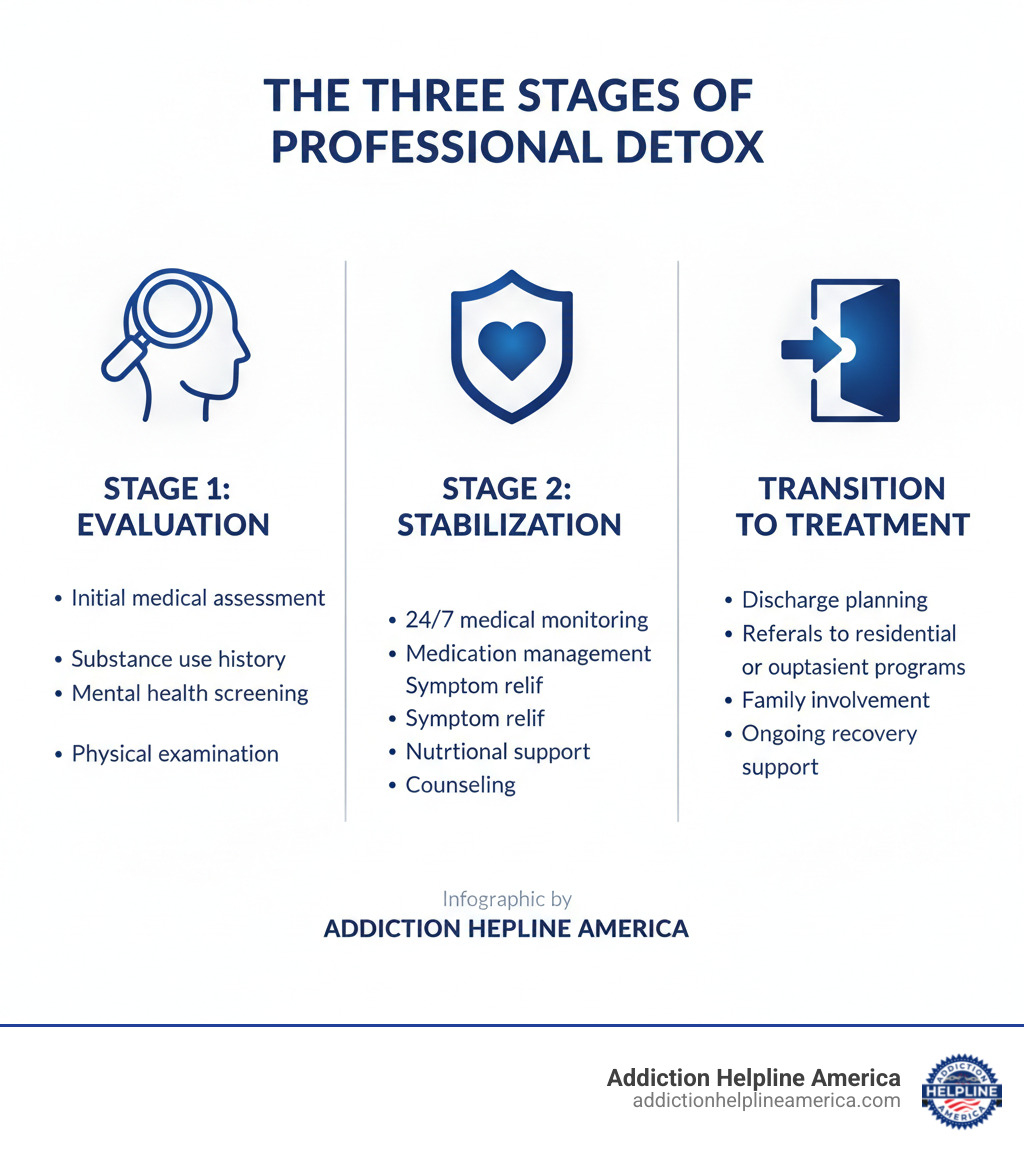
Understanding Your First Step Toward Recovery
A center for detox is a medical facility where you can safely withdraw from drugs or alcohol. These centers make the first step of recovery safer and more comfortable than quitting alone by providing 24/7 medical supervision, medication to ease withdrawal symptoms, and a structured, supportive environment.
Detoxification is the process of clearing substances from your body while managing withdrawal. A professional detox program involves three key stages:
- Evaluation: Assessing your physical and mental health, plus your substance use history.
- Stabilization: Managing withdrawal symptoms with medical and emotional support to keep you safe and comfortable.
- Transition to Treatment: Creating a plan and connecting you with ongoing recovery programs.
Detox is not a cure for addiction but a critical first step. A typical stay lasts three to ten days, preparing you for the long-term work of recovery. At Addiction Helpline America, our team offers free, confidential guidance 24/7 to help you find the right center for detox and take this crucial step.
Find more about center for detox:
What is a Detoxification Center and What Does It Do?
A center for detox is a medical facility designed to help you safely stop using substances. Its core function is managing withdrawal, the body’s reaction to the absence of a drug it has become dependent on. This process can be uncomfortable and, with certain substances, dangerous.
Detox centers provide 24/7 medical monitoring to ensure your safety. Nurses and doctors use medication to ease discomfort and manage complications. The goal is to stabilize you medically and emotionally before you transition to the next phase of treatment. Our network includes centers across the United States, staffed by professionals who are ready to help.
Learn more about Ambien Detox at Addiction Helpline America
Common Substances Requiring Detox
While many substances cause withdrawal, some are particularly dangerous to quit without professional help.
- Alcohol: Withdrawal can escalate from tremors and anxiety to life-threatening seizures and delirium tremens (DTs). Medical detox is essential to manage these risks.
- Opioids: Withdrawal from heroin, fentanyl, or painkillers causes severe flu-like symptoms and intense cravings. Medications like buprenorphine can significantly reduce this misery.
- Benzodiazepines: Abruptly stopping drugs like Xanax or Valium can cause seizures and psychosis. A slow, medically supervised taper is required for safety.
- Stimulants: While physical withdrawal from cocaine or meth is not typically life-threatening, the psychological crash—including severe depression and suicidal thoughts—requires a safe, supportive environment.
- Marijuana & Other Prescriptions: Even heavy marijuana use can lead to uncomfortable withdrawal symptoms like irritability and insomnia. Many other prescription drugs can also cause dependence, and a professional detox center can manage this process safely.
Signs and Symptoms of Withdrawal
Withdrawal symptoms vary but often include a combination of physical and psychological distress.
- Physical symptoms: Nausea, vomiting, body aches, tremors, sweating, headaches, and muscle spasms. In severe cases, seizures or hallucinations can occur.
- Psychological symptoms: Intense anxiety, depression, mood swings, insomnia, nightmares, and overwhelming cravings. Some people may experience thoughts of self-harm.
These symptoms are a sign that your body needs medical support, not a reason for shame.
Medical vs. Non-Medical Detox
Understanding the difference between detox levels helps you choose the right care.
Medical detox is for moderate to severe withdrawal (especially from alcohol, opioids, and benzodiazepines). It provides 24/7 care from licensed medical staff who can administer medication.
Non-medical detox (or social detox) is for mild withdrawal (e.g., from marijuana or some stimulants). It offers a supportive environment with counselors and peers but does not administer prescription medications.
| Feature | Medical Detox | Non-Medical/Social Detox |
|---|---|---|
| Staffing | 24/7 licensed medical professionals (nurses, doctors) | Primarily non-medical support staff (counselors, peers) |
| Medication | Administration of medications to manage withdrawal | No medication administered (or limited OTC options) |
| Withdrawal Severity | Designed for moderate to severe withdrawal symptoms | Suitable for mild withdrawal symptoms |
| Safety | Highest level of safety for medically complex cases | Relies on natural processes, less medical intervention |
| Focus | Acute stabilization, physical symptom management | Emotional support, safe environment, peer encouragement |
| Examples | Alcohol, Benzodiazepine, Opioid withdrawal | Mild cannabis or stimulant withdrawal, crisis support |
Addiction Helpline America can help you determine which type of center for detox is right for you based on your specific needs.
The Process: What to Expect at a Center for Detox
Walking into a center for detox takes courage, and it’s normal to feel nervous. The staff understands this and is there to guide you through the process, from your first call to your discharge.
The Admission Process and Eligibility
Your journey begins with a confidential phone screening. You’ll discuss your substance use, health history, and any mental health challenges. This helps determine the right level of care. At Addiction Helpline America, we can also handle insurance verification to reduce your stress.
Upon arrival at the center, you’ll undergo a comprehensive assessment, including a physical exam and a review of your substance use history. This evaluation helps create a personalized detox plan.
Eligibility criteria typically include:
- Being at least 18 years old (some exceptions exist).
- Being medically stable enough for a non-hospital setting.
- Attending voluntarily and being willing to participate in your recovery.
Typical Duration of a Stay
How long will you be there? Most stays at a center for detox last between three and ten days. The exact duration depends on several factors:
- The substance used: Withdrawal from alcohol or benzodiazepines may require a longer, more careful taper (a week or more), while opioid withdrawal may stabilize within five to seven days.
- Severity of dependence: Longer-term, heavier use often requires a longer detox period.
- Individual health: Co-occurring medical or mental health conditions can extend your stay to ensure you are fully stable before leaving.
The goal is not speed, but safety and stability to prepare you for the next step in recovery.
What to Pack and What to Leave Behind
Packing for detox means bringing items for comfort and recovery while leaving potential distractions or triggers at home.
What to Bring:
- ID (driver’s license or state ID) and your insurance card.
- Several days’ worth of comfortable, modest clothing (sweatpants, t-shirts, layers). Avoid clothing with drug/alcohol references.
- Alcohol-free toiletries (toothbrush, soap, shampoo).
- Any prescription medications in their original, labeled bottles. The nursing staff will manage these for you.
- A journal, pen, books, or magazines for downtime.
What to Leave at Home:
- All drugs, alcohol, and related paraphernalia.
- Weapons of any kind, including pocket knives.
- Most electronics, such as laptops, tablets, and often cell phones, to help you focus on recovery.
- Outside food or drinks.
Your belongings will be searched upon arrival to ensure a safe environment for everyone. This is a standard procedure designed to protect all clients.
Medical and Therapeutic Support During Detoxification
In a center for detox, you receive comprehensive support for your body and mind. The care you receive is designed to address both the physical and emotional challenges of withdrawal.
What Kind of Medical Support is Available?
Your safety is the top priority, ensured by a dedicated medical team.
- Licensed Nurses: On-site 24/7, nurses monitor your vital signs, manage symptoms, and administer medications as prescribed.
- Addiction Medicine Doctors: These specialists create and oversee your medical care plan, prescribing medications to prevent dangerous complications (like seizures from alcohol withdrawal) or ease severe discomfort (like with opioid withdrawal).
- 24-Hour Monitoring: Continuous observation means that if you experience a medical issue or severe discomfort, help is immediately available, day or night.
- Medication Management: The medical team uses FDA-approved medications to make withdrawal safer and more comfortable. They also provide relief for related symptoms like nausea, pain, and insomnia.
The Role of Counselors and Peer Support
Detox is an emotional process, and you won’t go through it alone.
- Individual Counseling: Private sessions with a counselor provide a safe space to process your feelings, understand the roots of your addiction, and begin developing healthier coping skills.
- Group Therapy: Connecting with others who share similar experiences is incredibly powerful. Group sessions reduce feelings of isolation and focus on practical skills for recovery, such as identifying triggers and managing cravings.
- Peer Specialists: Many centers include staff who are in recovery themselves. Their lived experience offers a unique form of hope and guidance, proving that a better life is possible.
Guiding Philosophies in a Center for Detox
Quality detox centers operate on principles that respect your dignity and individual needs.
- Trauma-Informed Care: This approach recognizes that many people with addiction have a history of trauma. The environment is designed to feel safe and empowering, avoiding practices that could be re-traumatizing.
- Harm Reduction: This philosophy focuses on reducing the negative consequences of substance use and meeting you where you are in your journey, with compassion and without judgment.
- Person-Centered Approach: Your treatment plan is custom to you. Your unique background, goals, and preferences are considered to create the most effective path forward.
Get help for mental health, drugs, or alcohol
Addiction Helpline America connects you with centers that embody these compassionate and effective principles.
Life After Detox: Transitioning to Lasting Recovery
Completing detox is a major victory, but it’s the beginning of recovery, not the end. A center for detox stabilizes your body, but the underlying causes of addiction require ongoing attention. Addiction is a chronic condition that needs long-term management, just like diabetes or heart disease.
This is why every quality detox center emphasizes comprehensive discharge planning. Before you leave, the clinical team works with you to create a clear, actionable plan for continuing your recovery journey, ensuring you have the support you need to succeed.
How Centers Support the Transition to Further Treatment
A key role of a detox center is to connect you to the right next level of care. Based on your needs, they will provide referrals to programs like:
- Residential Programs (Inpatient Rehab): These offer an immersive, structured environment where you live at the facility for 30-90 days or more. This is ideal for focusing entirely on recovery without outside triggers.
- Outpatient Programs (IOP/PHP): Intensive Outpatient (IOP) and Partial Hospitalization (PHP) programs allow you to live at home while attending treatment for several hours a week. This provides flexibility while still offering robust therapeutic support.
- Ongoing Recovery Support: Detox staff will also connect you with community resources. This includes 12-step groups like Alcoholics Anonymous (AA) and Narcotics Anonymous (NA), as well as other groups like SMART Recovery. They help you set realistic goals for the weeks and months ahead.
Luxury Drug Rehab Centers Near Me
How Do Detox Centers Support Family Members?
Addiction affects the entire family. Quality detox centers recognize this and offer resources to help loved ones heal, too.
- Family Therapy & Education: Many centers offer family counseling sessions to rebuild trust and improve communication. Educational workshops help families understand addiction as a disease, which shifts the dynamic from blame to support.
- Learning Healthy Boundaries: Families learn to distinguish between supporting recovery and enabling substance use. This is crucial for creating a home environment that fosters long-term sobriety.
- Referrals to Support Groups: Staff can refer family members to groups like Al-Anon and Nar-Anon, where they can connect with others who understand their struggles.
When families heal together, the individual’s chance of lasting recovery increases significantly. Addiction Helpline America can help find programs that offer this vital family support.
Navigating Costs and Accessing Care
One of the biggest worries when seeking help is the cost. “Can I afford this?” is a common and valid question. The good news is that financial barriers should not prevent you from getting help at a center for detox. There are many ways to access affordable care.
What are the Costs and Are There Free Services?
Costs for detox vary based on the facility, level of care, and length of stay. However, many people pay little to nothing out-of-pocket thanks to various coverage options.
- Private Insurance: The Affordable Care Act requires most insurance plans to cover addiction treatment. You may have a deductible or copay, but a significant portion of the cost is often covered.
- Medicaid and Medicare: These government programs provide coverage for detox services, making treatment accessible at little or no cost for eligible individuals.
- State-Funded Programs: Many states operate publicly funded programs to help residents access care regardless of their ability to pay.
Our team at Addiction Helpline America specializes in navigating these options. We can verify your insurance and explain your benefits in simple terms, free of charge.
More info on Free Addiction Treatment
Are there free services available at a center for detox?
Yes, free and low-cost options are available.
- Non-Profit Organizations: Many detox centers are run by non-profits that use grants and donations to offer services for free or at a reduced cost.
- Sliding Scale Fees: Some facilities adjust their fees based on your income. This ensures that you pay only what you can reasonably afford.
- Publicly Funded Centers: County and state-run programs are specifically designed to serve those with limited financial resources. Many operate on the principle that no one will be turned away due to an inability to pay.
Don’t let financial concerns stop you from making the call. We can help you find a center for detox that fits your budget and your needs.
Find Free Methadone Clinics Near Me
Conclusion: Taking the First Step Toward a New Life
Choosing to seek help is a courageous first step toward recovery. A center for detox provides a safe, medically supervised environment to get through withdrawal, but it is a starting point, not a final destination.
During your stay, you are not just clearing substances from your body; you are preparing for the real work of recovery that follows. Lasting sobriety is achieved through continued treatment, support, and a commitment to a new way of life. Recovery is possible, and it starts here.
At Addiction Helpline America, we have helped thousands of people find their way out of addiction. Our team provides free, confidential guidance 24/7, connecting you to our trusted nationwide network of facilities. We can help you find the right center for detox and the right long-term treatment program for your unique situation, regardless of your location or financial status.
One phone call can change everything. Your new life is waiting. Let us help you take that first step.
Find the right alcohol and drug addiction treatment program for you
Our helpline is 100%
free & confidential
If you or someone you care about is struggling with drug or alcohol addiction, we can help you explore your recovery options. Don’t face this challenge alone—seek support from us.
Programs
Resources
Will my insurance
cover addiction
treatment?
We're ready to help
Find the best
drug or alcohol treatment
center
Are you or a loved one struggling with addiction? Call today to speak to a treatment expert.
















